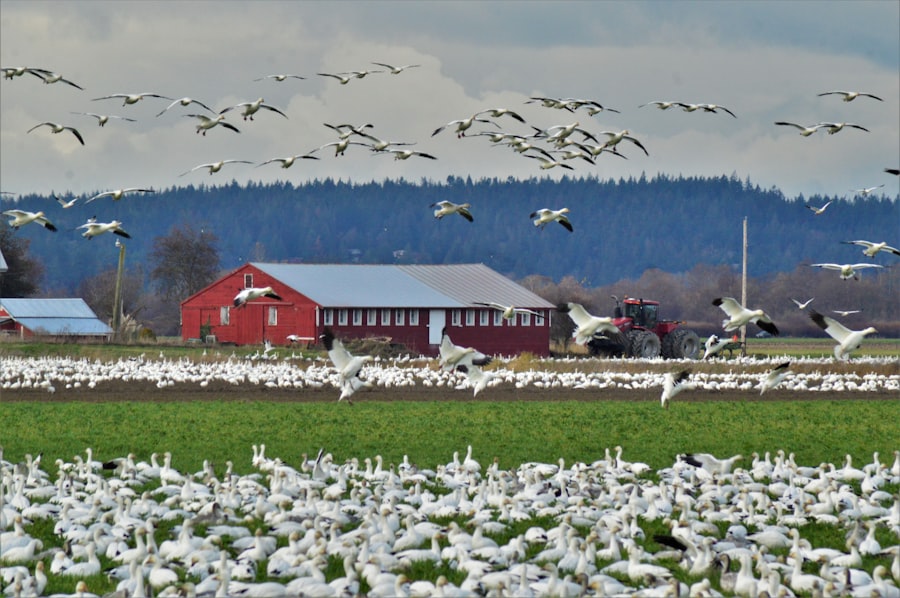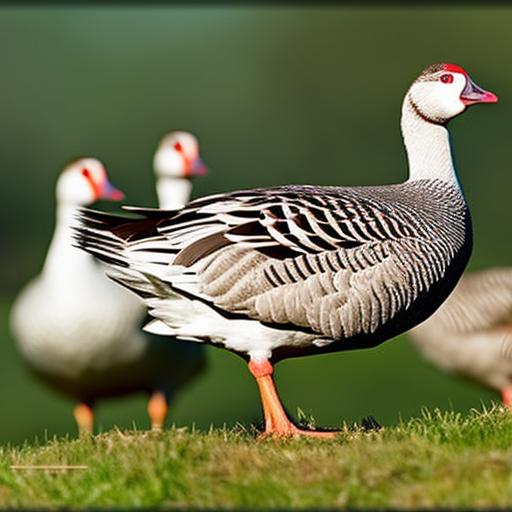Geese keeping is a hobby that has been gaining popularity in recent years. It involves raising geese for various purposes, such as egg production, meat, or simply as pets. Geese are known for their intelligence, loyalty, and social nature, making them great companions for those who enjoy the company of animals.
One of the main benefits of raising geese is the joy and satisfaction that comes from caring for these beautiful creatures. Geese are highly social animals and form strong bonds with their owners. They are known to be affectionate and can even recognize their human caregivers. This bond can bring a sense of fulfillment and companionship to geese keepers.
In addition to the emotional benefits, geese keeping also offers practical advantages. Geese are excellent grazers and can help maintain the health of your lawn or pasture by eating weeds and insects. They also produce nutrient-rich manure that can be used as fertilizer for gardens or crops. Furthermore, geese can be a source of fresh eggs and meat for those who choose to raise them for these purposes.
Key Takeaways
- Geese keeping can be a rewarding hobby for those interested in animal husbandry.
- Choosing the right breed of geese is important for meeting your specific needs.
- Proper housing and feeding are crucial for the health and well-being of geese.
- Understanding geese behavior and communication can help you better care for them.
- Preventing common diseases and promoting wellness is key to successful geese keeping.
Choosing the Right Breed of Geese for Your Needs
When it comes to choosing the right breed of geese, there are several factors to consider. Different breeds have different characteristics and are suited for different purposes. Some breeds are known for their egg-laying abilities, while others are bred for their meat production.
Some popular breeds for egg production include the Toulouse, Embden, and Chinese breeds. These breeds are known for their large size and high egg production rates. They lay large eggs with thick shells and have a calm temperament, making them easy to handle.
If you’re interested in raising geese for meat, breeds such as the Pekin, African, or American Buff are good options. These breeds have a high meat-to-bone ratio and produce tender and flavorful meat. They also grow quickly, making them ideal for meat production.
When choosing a breed, it’s important to consider your specific needs and preferences. Factors such as climate, available space, and intended purpose should all be taken into account. It’s also a good idea to consult with experienced geese keepers or breeders to get advice on the best breed for your situation.
Housing and Feeding Geese: Tips and Tricks
Proper housing and feeding are essential for the health and well-being of your geese. Geese require a safe and comfortable shelter that protects them from the elements and predators. The housing should be spacious enough to allow the geese to move around freely and have access to fresh air and sunlight.
Geese also need access to water for swimming and drinking. A small pond or pool can be provided for this purpose. It’s important to ensure that the water is clean and regularly refreshed to prevent the spread of diseases.
In terms of feeding, geese have specific dietary requirements that need to be met for optimal health. They are herbivores and primarily feed on grass, weeds, and other vegetation. It’s important to provide them with a balanced diet that includes a variety of greens, grains, and supplements.
Fresh grass should make up the majority of their diet, especially during the grazing season. In addition to grass, geese can be fed commercial poultry feed or a mix of grains such as corn, wheat, and barley. It’s important to provide them with enough food to meet their nutritional needs but avoid overfeeding, as this can lead to obesity and other health issues.
Understanding Geese Behavior and Communication
Geese have unique behaviors and communication methods that are important to understand as a geese keeper. Understanding their behavior can help you better care for them and ensure their well-being.
Geese are highly social animals that live in flocks. They have a strong sense of hierarchy and establish a pecking order within their group. This hierarchy is determined through displays of dominance and submission, such as hissing, honking, and wing flapping.
Communication among geese is primarily done through vocalizations and body language. Honking is the most common form of vocalization and can have different meanings depending on the context. For example, a loud honk can be a warning signal to alert the flock of potential danger, while a softer honk can be a sign of contentment.
Geese also use body language to communicate with each other and with humans. They may raise their wings or stretch their necks as a sign of aggression or dominance. On the other hand, they may lower their heads or tuck their wings as a sign of submission or fear.
As a geese keeper, it’s important to observe and interpret these behaviors and communication signals to ensure the well-being of your geese. It’s also important to establish trust and build a bond with your geese through positive reinforcement and gentle handling.
Health and Wellness of Geese: Common Diseases and Prevention
Like any other animals, geese are susceptible to certain diseases that can affect their health and well-being. It’s important to be aware of these diseases and take preventive measures to keep your geese healthy.
Some common diseases that affect geese include avian influenza, botulism, and parasites such as worms and mites. Avian influenza is a viral disease that can cause respiratory problems, decreased egg production, and even death in severe cases. Botulism is a bacterial disease that affects the nervous system and can cause paralysis and death.
To prevent these diseases, it’s important to practice good biosecurity measures, such as keeping your geese in a clean environment, providing them with clean water, and regularly disinfecting their housing. It’s also important to vaccinate your geese against certain diseases, especially if you live in an area where they are prevalent.
Regular health checks by a veterinarian are also recommended to ensure the early detection and treatment of any potential health issues. It’s important to monitor your geese for any signs of illness, such as decreased appetite, lethargy, or changes in behavior.
In addition to preventive measures, providing a balanced diet, clean water, and proper housing can help boost the immune system of your geese and keep them healthy. Regular exercise and access to fresh air and sunlight are also important for their overall well-being.
Breeding and Hatching Geese: The Basics

Breeding geese can be a rewarding experience for geese keepers. It allows you to expand your flock and potentially produce offspring that can be raised for various purposes, such as egg production or meat.
Breeding geese involves selecting a compatible pair of geese and providing them with the right conditions for mating. Geese are monogamous animals and form long-term pair bonds. It’s important to choose geese that are of breeding age and in good health.
Once the geese have mated, the female will lay eggs that need to be incubated for hatching. Geese eggs have a long incubation period of around 28-35 days. During this time, it’s important to provide the eggs with the right temperature and humidity levels for successful hatching.
After hatching, the goslings will need to be brooded in a warm and safe environment until they are old enough to join the rest of the flock. This involves providing them with heat lamps or brooders, clean bedding, and access to food and water.
Successful breeding and hatching require careful planning and attention to detail. It’s important to research and educate yourself on the breeding process before attempting it. Consulting with experienced breeders or joining a local geese keeping community can also provide valuable guidance and support.
How to Raise and Train Geese for Egg Production and Meat
Raising geese for egg production or meat requires specific techniques and strategies to ensure optimal results. Whether you’re raising geese for their eggs or meat, it’s important to provide them with the right conditions and training to maximize their productivity.
For egg production, it’s important to select geese breeds that are known for their high egg-laying abilities, such as the Toulouse or Embden breeds. Providing them with a balanced diet, clean water, and proper housing is essential for optimal egg production. It’s also important to collect the eggs regularly and provide nesting boxes or areas for the geese to lay their eggs.
For meat production, it’s important to select geese breeds that are known for their meat quality and growth rate, such as the Pekin or African breeds. Providing them with a high-protein diet and ample space for exercise is important for their growth and development. It’s also important to ensure that the geese are processed humanely and in accordance with local regulations.
Training geese for these purposes involves establishing a routine and providing positive reinforcement. Geese can be trained to come when called, follow commands, or even perform simple tricks. Training can be done through repetition, rewards, and gentle handling.
Geese and Pest Control: Their Role in Farming and Gardening
Geese can play a valuable role in pest control on farms and gardens. Their grazing habits make them excellent weed eaters, and they can help control pests such as slugs, snails, and insects.
Geese are natural grazers and prefer to eat grass and other vegetation over other types of food. They can help keep lawns, pastures, and gardens free from weeds by eating them before they have a chance to spread. This can reduce the need for chemical herbicides and manual weeding.
In addition to weed control, geese can also help control pests such as slugs and snails. These pests can damage crops and gardens, but geese are known to eat them as part of their natural diet. By allowing geese to graze in your garden or farm, you can reduce the population of these pests and protect your plants.
It’s important to note that while geese can be effective in pest control, they should be managed properly to prevent overgrazing or damage to crops. Rotational grazing and providing alternative food sources can help ensure that the geese have enough to eat without causing harm to the vegetation.
Geese Conservation and Preservation Efforts: How You Can Help
Geese conservation is an important aspect of geese keeping. Many species of geese are facing threats such as habitat loss, pollution, and hunting. It’s important to take steps to preserve and protect these beautiful creatures for future generations.
One way you can help with geese conservation efforts is by supporting organizations that work towards the preservation of geese populations. These organizations often conduct research, habitat restoration projects, and public education programs to raise awareness about the importance of geese conservation.
You can also contribute to geese conservation by creating a suitable habitat for geese on your property. This can involve providing nesting sites, food sources, and water sources for geese. Planting native vegetation and avoiding the use of pesticides or herbicides can also help create a safe environment for geese.
Educating others about the importance of geese conservation is another way you can make a difference. By sharing your knowledge and experiences with others, you can raise awareness about the challenges facing geese populations and inspire others to take action.
The Business of Geese Keeping: Opportunities and Challenges
Geese keeping can also be a viable business opportunity for those interested in agriculture or animal husbandry. There are several ways to make money with geese, such as selling eggs, meat, feathers, or even live geese.
One of the main opportunities in the geese keeping industry is the sale of geese eggs. Geese eggs are in high demand for culinary purposes and can be sold to restaurants, bakeries, or directly to consumers. The high egg production rates of certain breeds make them ideal for commercial egg production.
Another opportunity is the sale of geese meat. Geese meat is considered a delicacy in many cultures and can be sold at a premium price. Raising geese for meat requires careful planning and management to ensure optimal growth and meat quality.
The sale of feathers and down is another potential income stream for geese keepers. Feathers and down can be used in various industries, such as fashion, bedding, or crafts. Collecting and selling feathers can be a sustainable way to generate income from your geese.
While there are opportunities in the geese keeping industry, there are also challenges that need to be considered. Running a geese keeping business requires knowledge of animal husbandry, marketing skills, and a strong work ethic. It’s important to have a solid business plan and be prepared for the challenges that come with running a farm-based business.
Geese keeping is a rewarding hobby that offers numerous benefits, both emotional and practical. Whether you’re raising geese for companionship, egg production, meat, or pest control, there are many aspects to consider to ensure the health and well-being of your geese.
Choosing the right breed of geese, providing proper housing and feeding, understanding their behavior and communication, and taking preventive measures for their health are all important factors to consider as a geese keeper. Breeding and hatching geese, raising them for specific purposes, incorporating them into pest control strategies, and contributing to conservation efforts are additional aspects that can enhance your geese keeping experience.
While geese keeping can be a hobby, it can also be a viable business opportunity. By exploring the various avenues for making money with geese and being prepared for the challenges that come with running a business, you can turn your passion for geese into a profitable venture.
Overall, geese keeping is a fulfilling and rewarding endeavor that offers a unique connection with nature and the animal kingdom. Whether you’re a beginner or an experienced geese keeper, there is always something new to learn and discover in the world of geese keeping. So why not give it a try and experience the joy and satisfaction that comes from caring for these beautiful creatures?
If you’re interested in geese keeping, you may also find this article on converting a shed into a chicken coop from Poultry Wizard quite useful. It provides valuable insights and practical tips on how to repurpose a shed to create a comfortable and functional space for your geese. Whether you’re a beginner or an experienced poultry keeper, this article offers step-by-step guidance and helpful suggestions to ensure your geese have a safe and cozy home. Check it out here.
Meet Walter, the feathered-friend fanatic of Florida! Nestled in the sunshine state, Walter struts through life with his feathered companions, clucking his way to happiness. With a coop that’s fancier than a five-star hotel, he’s the Don Juan of the chicken world. When he’s not teaching his hens to do the cha-cha, you’ll find him in a heated debate with his prized rooster, Sir Clucks-a-Lot. Walter’s poultry passion is no yolk; he’s the sunny-side-up guy you never knew you needed in your flock of friends!







